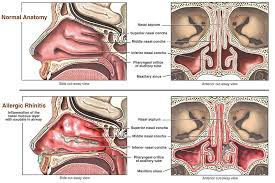
Allergic rhinitis is a common upper respiratory tract condition characterized by inflammation of the nasal mucosa due to an allergic reaction to various allergens. This type of rhinitis can significantly impact quality of life, causing diverse symptoms and complicating daily tasks.
Causes and Development Mechanism
Allergic rhinitis is typically triggered by allergens affecting the nasal mucosa of sensitive individuals. Allergens may include:
- Pollen: One of the most common causes of allergic rhinitis. Plant pollen, such as from trees, grasses, and flowers, can induce an allergic reaction in individuals with pollen allergy (seasonal allergic rhinitis).
- Household dust and mites: These include dust, dust mites, animal dander, and other allergens found in the home environment.
- Mold and fungi: Mold spores present in damp and dark areas can act as potent allergens.
- Pets: Animal fur, feathers, and saliva can trigger allergic rhinitis in sensitive individuals.
- Other allergens: Additionally, allergic rhinitis can be caused by contact with other allergens such as certain foods, medications, etc.
The development mechanism of allergic rhinitis is associated with the immune system’s reaction to external allergens. Upon contact with an allergen, the immune system produces IgE antibodies that bind to mast cells and basophils, cells containing histamine. Subsequent contact with the same allergen leads to mast cell degranulation and release of chemical mediators, including histamine, which causes inflammation of the nasal mucosa.
Symptoms
Symptoms of allergic rhinitis can range from mild to severe and include:
- Runny nose: Continuous discharge of liquid secretions from the nose, often clear or cloudy in color.
- Nasal itching and irritation: Sensation of itching, burning, or irritation in the nose, which can be intense.
- Sneezing: Persistent or repetitive sneezing, especially upon exposure to allergens.
- Nasal congestion: Sensation of stuffiness or difficulty breathing through the nose.
- Cough and difficulty breathing: Some individuals with allergic rhinitis may also experience coughing, especially at night, and difficulty breathing.
- Fatigue: Prolonged disruption of normal sleep due to rhinitis symptoms can lead to fatigue and irritability.
- Conjunctivitis: In some individuals, allergic rhinitis may be accompanied by inflammation of the conjunctiva of the eyes, manifesting as redness, itching, and tearing.
Diagnosis
Diagnosis of allergic rhinitis typically relies on clinical symptoms, medical examination, and patient history. However, in some cases, additional tests may be required, including:
- Skin allergy tests: Used to determine allergic sensitivity to various allergens.
- Blood tests for IgE: Measurement of IgE antibody levels in the blood can help identify allergic reactions to specific allergens.
- Rhino manometry and rhinoscopy: These tests allow assessment of nasal congestion severity and the condition of the nasal mucosa.
Treatment and Management
Treatment of allergic rhinitis aims to relieve symptoms and prevent their recurrence. It includes the following methods:
- Avoidance of allergens: The primary method of managing allergic rhinitis is to avoid contact with known allergens. This may involve using impermeable mattresses and pillows to protect against dust mites, regular home cleaning to reduce dust and pollen, and avoiding contact with pets.
- Medications: Antihistamine medications are widely used in the treatment of allergic rhinitis to reduce itching and nasal mucus secretion. Glucocorticoid nasal sprays may be used to reduce inflammation of the nasal mucosa.
- Immunotherapy: Immunotherapy may be recommended for some patients with allergic rhinitis, involving gradual introduction of allergens to reduce sensitivity to them.
- Surgical methods: In rare cases where allergic rhinitis does not respond to conservative treatment, surgical intervention may be required, such as corrective surgery of the nasal septum or removal of nasal polyps.
Prognosis and Complications
The prognosis of allergic rhinitis is generally favorable with proper treatment and symptom management. However, uncontrolled allergy over the long term may lead to the development of other conditions such as sinusitis, pollenosis, asthma, and other allergic diseases.
Prevention
Prevention of allergic rhinitis involves measures to avoid contact with known allergens, such as regular home cleaning, the use of pollen and dust protection, and avoiding contact with pets. Regular medical check-ups and consultations with a doctor can also help in early detection and management of allergic rhinitis.
Allergic rhinitis can significantly impact people’s quality of life, limiting their daily activities and worsening overall well-being. Understanding the causes, symptoms, diagnostic methods, and treatment of this condition plays a crucial role in its effective control and improvement of patients’ quality of life.
